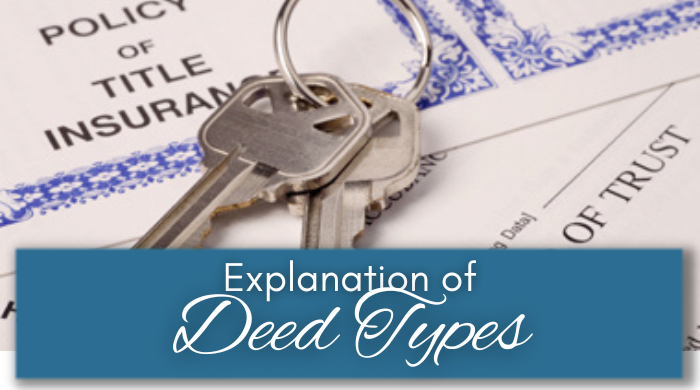Deeds Explained

What is a Deed?
The physical document that transfers the property from the Seller, or Grantor to the Buyer, or Grantee.
Are all Deeds the same?
No, they aren't. There are different types of deeds. The one you should choose is based on your individual needs today or in the future.
General Warranty Deed
Most common deed used in Ohio. This is the conveyance of real estate by Grantor in fee simple to Grantee, its heirs, assignees or successors. Grantor warrants and defends the Grantee, his/her heirs, and assignees/successors against the lawful claims and/or demands of others. Conveyance to more than one creates a “tenancy-in-common” relationship which means that each owner owns an undivided interest in the property (unless specifically stated in the deed.)
Limited Warranty Deed
Most common deed used in Ohio. This is the conveyance of real estate by Grantor in fee simple to Grantee, its heirs, assignees, or successors. Grantor/Seller ONLY warrants title to Grantee/Buyer during the time period that it held the title. Grantor/Seller is NOT responsible for matters previous to Grantor's acquisition. The type of deed is commonly used in commercial transactions between corporations and/or other business entities. Title insurance will further protect Grantor/Grantee not only during Grantors ownership interest but prior to.
Joint & Survivorship Deed
Frequently used when two or more individuals are Buying together.
Upon the death of one of the owners, title transfers to the survivor(s) upon recordation of a certified death certificate, thus avoiding probate. Survivorship language can be combined with any other type of deed be it Warranty Fiduciary, Quit Claim, etc.)
Fiduciary Deed
Conveyance of real property made by an Executor, Administrator, Guardian, Trustee, etc. to the grantee, or new owner, or Buyer. A fiduciary deed states that the grantor has the legal authority to transfer the property in their respective capacity.
Quit Claim Deed
Conveyance of real estate in fee simple of whatever interest the Grantee owns. Grantee assumes real estate “as is” and no warranties are expressed nor implied.









